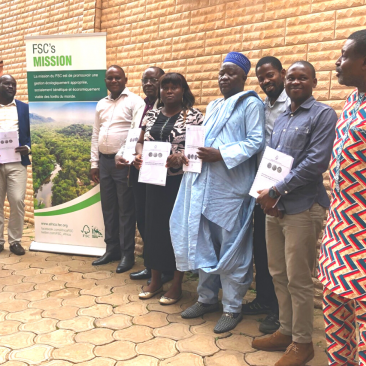
Experts gather in Cameroon to expand local forest standard to benefit communities
The process is led by a standard development group (SDG) who are aiming to expand the scope of Cameroon’s national forest stewardship standard (NFSS). This NFSS is a localized FSC forest stewardship standard developed through years of organized and inclusive multi-stakeholder consultation processes. Cameroon's original NFSS was launched in 2020.
Cameroon’s NFSS reflects local cultural norms, values, customs, and laws as well as international conventions, says Dr Fobane Jean-Louis, Forest Management Consultant at NELF-Environment (forest management partner), a participant representing one of the economic sector members of the SDG. Dr Fobane was part of the process when it began in 2015. He believes the tool is an excellent innovation that can help forest managers and forest companies effectively manage the forests in Cameroon.
Why the revision?
This new partial revision comes at a time when the country is looking to boost its wood and timber industry. The review intends to include non-timber forest products (NTFPs) and other forest products and services to the scope of the NFSS that formerly included only timber. These NTFPs include a wide variety of fruits, nuts, vegetables, medicinal plants, wildlife, and more that make up the daily lives of forest communities. Data shows NTFPs are a regular source of revenue for local forest communities and certifying them would ensure sustainability and improve access to responsible markets.
Forest communities rely on non-timber forest products for their livelihoods and survival, according to Prof Roger Ngoufo, Sustainable Forest Management Expert and Chair of the Standard Development Group.
"By including their activity [in the NFSS], we can provide local forest communities with tools for better protection and give them the opportunity to grow the activity and contribute to the local forest economy."
According to national figures, the forest sector accounts for 6% of the country’s gross domestic product. Prof. Ngoufo says the exercise offers the group an opportunity to explore how the country’s national forest stewardship standards can strengthen the local economy. He adds that the process will help the country reduce the risk of illegal logging and meet its economic, social, and ecological goals.
William Lawyer, Policy, and Standards Manager, FSC Africa, who provided technical support during the discussions, says the multi-stakeholder process will run for several months and will end with a revised NFSS that reflects the views of all affected and interested stakeholders. He stresses that the NFSS drafts that the SDG will produce during this revision process will be shared with all relevant stakeholders in Cameroon for further comments. Following that, the SDG will consider and include all feedback in the final revised NFSS document.
